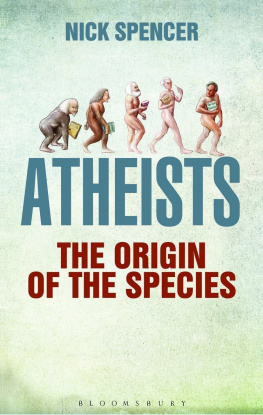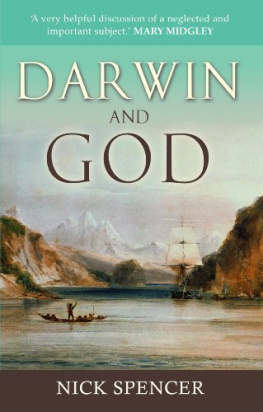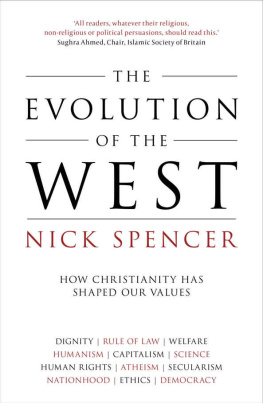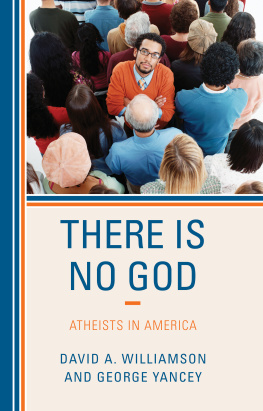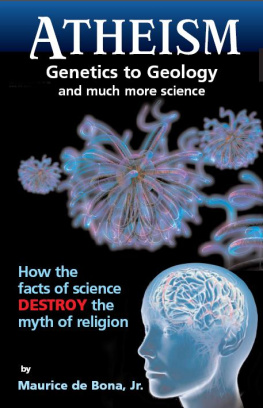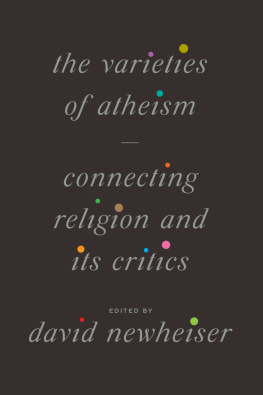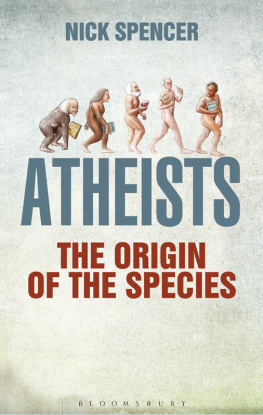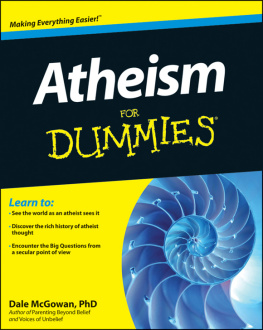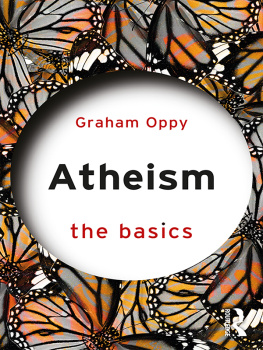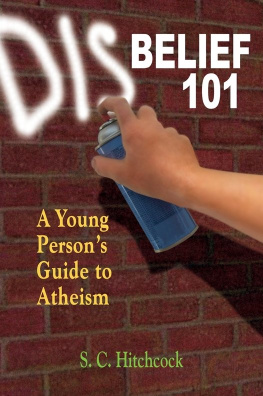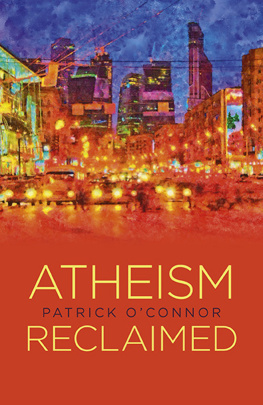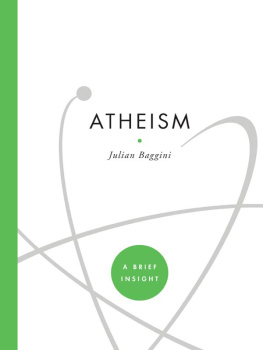ATHEISTS: THE ORIGIN OF THE SPECIES
Atheists: The Origin of the Species
Nick Spencer

Dedicated to the memory of Robin Joyce (19732013), endlessly fascinated by its subject, present at its conception, not at its conclusion. Badly missed.
Atheism is often merely a variety of Christianity. In fact, several varieties. There is the High Church Atheism of Matthew Arnold, there is the Auld Licht Atheism of our friend Mr J. M. Robertson, there is the Tin Chapel Atheism of Mr D. H. Lawrence. And there is the decidedly Low Church Atheism of Mr Russell.
T. S. Eliot, reviewing Bertrand Russells Why I Am Not a Christian, 1927
Atheism should always be encouraged (i.e. rationalistic not emotional atheism) for the sake of the Faith.
T. S. Eliot to Richard Aldington, 24 February 1927
Atheist as I am sir, atheist as I am, no man shall stand between my soul and my God!
Heckler at a Christian Socialist Lecture, quoted in F. C. Bettany,
Stewart Headlam (John Murray, 1926)
Contents
There are number of people without whom this book would be larger, weaker, duller or non-existent.
I owe a great deal to Caroline Chartres at Bloomsbury who saw the potential for a history of atheism just as I was trying to pitch a different book altogether. She came up with a title, persuading me out of something much more worthy and much less memorable. No less importantly, she talked me down from the ledge of a much longer book. I dont know which I should be more grateful for. Thanks are also due to Joel Simons who carefully steered the book through production.
I was delighted when my old friend Phill Hatton agreed to do the artwork for the cover, filling the gap that the Cameleopard left in our lives. His work turned out to be even more impressive than I had imagined it would.
A number of people read and commented on the manuscript in whole or in parts. I am grateful to them all but would like to single out three in particular: John Coffey, whose constant supply of advice and encouragement is truly humbling; John Hedley Brooke whose knowledge of the topic and eye for detail knows no peers; and Toby Hole, whose friendship and wisdom is one of the things that makes life worth living.
I was extremely grateful to Charles Devellennes for allowing me to read his unpublished doctoral thesis on the atheism of Jean Meslier and Baron DHolbach, on which draws.
My colleagues at Theos Elizabeth Oldfield, Paul Bickley, Ben Ryan, and Alanna Harris have been a constant support, as have Katie, Ellen and Jonny without whom none of this is worthwhile.
The dedication contains one final, enormous debt, which was never fully recognized.
Nick Spencer
London, 2013
Once upon a time there was a terrible monster that lived in the sky. No one had ever seen it because it lived a long way away, and because it was invisible, but everyone knew it was there because a long time ago it had shown itself to some very clever men.
These very clever men explained how the monster had one head, three bodies and a thousand eyes, with which it could see into peoples souls. They told terrible tales of what the monster would do if it got angry but also of how kind it was if people would only worship it without thought or question. They explained how the monster had given them a powerful magic, which, if used rightly, would protect the world from evil.
Sometimes the monster would get angry and when it did the clever men would offer it sacrifices, dragging people into market squares where they would burn them alive, just to show the monster how much they loved it.
The people listened to the very clever men and believed them. But they still yearned to be free of the monster.
And then, one day, a few brave men, who had only ever pretended to believe in the monster, unearthed a chest of strange metal. The chest had been hidden by an earlier, wiser, freer people, who had lived in the land before the monster came, and had known a better way of life.
Ever so slowly, the men began to work the metal, which they called reason, using it to forge a new weapon, which they called science, and they used science to attack the monster, and the very clever men. They had to be very careful at first because if anyone was caught using science, they would be dragged into market squares where they would be burned alive, and indeed this was how many men lost their lives.
But these were brave men, not to be fooled by fables or cowed by threats. Their band multiplied and their weapons grew in number and power until one day, a brilliant, reclusive rebel invented a super-weapon, which he called evolution, which could punch clean through the monsters armoured scales.
After that, the attacks increased in frequency and ferocity until one day the rebels were able to show the people what they had long known themselves. The monster had never actually existed. It was just a tale told by the very clever men to keep themselves in riches and power. Slowly the truth spread and although some very clever men still cling to riches and power, and some very stupid ones still believe them, gradually, wonderfully, the world is being set free.
Or so the story goes. Every culture has its ancient creation myth, and this is atheisms, albeit one that is only about 150 years old. Atheism emerged in Europe through the services of reason, science and evolution and in the teeth of often brutal religious opposition. In as far as the history of modern atheism is told, it is often a variant of this myth.
This book tries to tell a different story. This is not to say that atheisms creation myth is wholly untrue. Creation myths are rarely wholly untrue. In this instance the tale is true enough to be believable, even if its not true enough to be true. Modern atheism did indeed emerge in Europe in the teeth of religious, i.e. Christian, opposition. But it had only a limited amount to do with reason and even less with science. The creation myth in which a few brave souls forged weapons made of a previously unknown material, to which the religious were relentlessly opposed, is an invention of the later nineteenth century, albeit one with ongoing popular appeal. In reality, this book argues, modern atheism was primarily a political and social cause, its development in Europe having rather more to do with the (ab)use of theologically legitimized political authority than it does with developments in science or philosophy.
One way of understanding this is to go back to the earliest years of the Christian church. In the first and second centuries, in as far as Christians were noticed at all, it was for their political disobedience, their apparently cannibalistic and incestuous rites, and their atheism. But it also lies in the fact that, in thus limiting their worship, they refused to recognize the divinity of the emperor.
In about AD 160, the octogenarian bishop of Smyrna, Polycarp, was given a choice: either denounce your fellow (Christian) atheists and burn incense to Caesar (thereby acknowledging his divinity), or face the pyre. He chose the latter, preferring instead to call the baying crowd atheists. Even in the ancient world which had we like to imagine a tolerant and flexible attitude to religious belief, who you worshipped was intricately tied up with questions of who you obeyed and how you lived. Rejecting the gods constituted a serious threat to public order, one that demanded severest punishment. Ancient atheism, at least in its Christian incarnation, was not only about denying the powers in heaven but also defying the powers on earth.
As with ancient atheism, so with modern: religion, in the form of Christianity,
Next page
